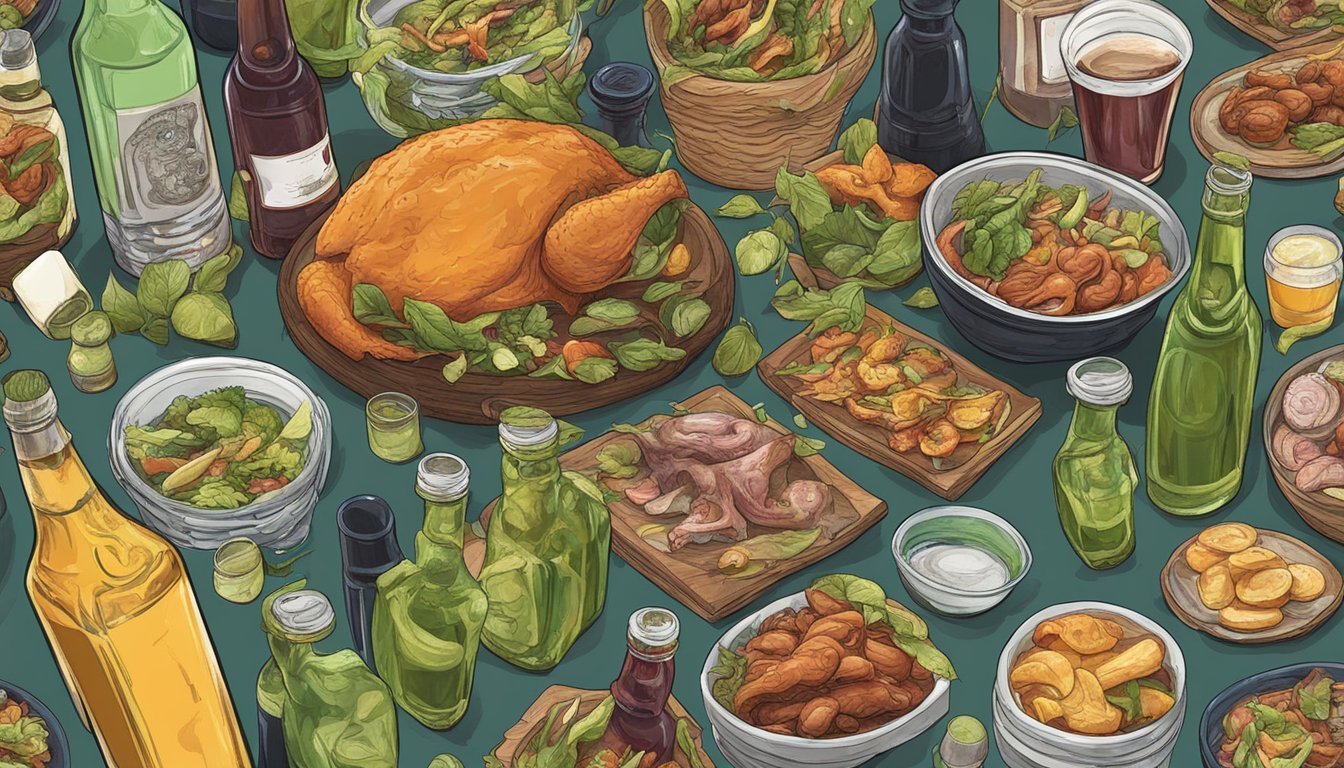Carnivore Diet and Alcohol
Understanding the Impact on Health and Performance
This Article is Part Of Our Guide on the Carnivore Diet
The carnivore diet emphasizes the consumption of animal products and the elimination of carbohydrates, focusing on meats, fish, eggs, and certain dairy products. It is a restrictive regimen that posits the consumption of animal-derived foods as a means to optimize health, often aiming to reduce inflammation and eliminate foods believed to cause sensitivities. This diet's approach to alcohol is cautious; since alcohol is neither a carbohydrate nor a protein, it does not neatly fit within carnivore dietary guidelines.
Alcohol consumption presents a unique set of considerations for those following a carnivore diet. The diet's low-carb nature tends to lead to a decreased tolerance for alcohol, as the body adapts to utilizing fats and proteins for energy, effectively making it more sensitive to the effects of alcohol. Moreover, the inclusion of alcohol can impact metabolism, potentially slowing down the fat-burning process and negating some of the purported benefits of the carnivore lifestyle.
Understanding the role alcohol can play in a carnivore diet is pivotal, as it can interfere with metabolism, alter willpower, increase food cravings, and contribute to addiction. While some proponents argue that certain types of alcohol, like spirits or dry wines, may be consumed in moderation, the consensus leans toward minimal or no alcohol intake to maintain the diet's integrity and health objectives.
Understanding the Carnivore Diet
This section provides an in-depth look at the Carnivore Diet, emphasizing its foundational principles, nutritional benefits, and common dietary inclusions and exclusions.
Definition and Core Principles
The Carnivore Diet is a high-protein, low-carbohydrate diet that focuses exclusively on the consumption of animal products. Adherents of this diet subscribe to the belief that a diet centered on animal protein and fats aligns with human evolutionary nutrition.
Protein and Fats: The diet prioritizes a high intake of protein and fats.
Simple Ingredient List: Primarily consists of meat, fish, eggs, and select dairy products.
Health Benefits and Nutritional Focus
Proponents of the Carnivore Diet suggest various health benefits attributed to its specific nutritional focus:
Rich in Certain Nutrients: Provides ample vitamin A and zinc, nutrients often abundant in animal products.
Low in Carbohydrates: Aims to induce a state of ketosis, similar to the ketogenic diet, which may aid in weight loss.
Nutritional Focus:
Protein
Source: Meat, Fish, Eggs
Purpose: Muscle repair and growth
Fats
Source: Butter, Cheese
Purpose: Energy, hormone production
Vitamin A
Source: Liver, Fish
Purpose: Vision, immune function
Zinc
Source: Red meat, Shellfish (What wine goes well with shellfish?)
Purpose: Immune support, wound healing
Common Foods and Restricted Items
Common Foods:
Animal products form the foundation of the Carnivore Diet:
Meat: Any type, including beef, pork, and poultry.
Fish: All types, favoring fatty fish for their omega-3 content.
Eggs and Dairy: Preferably from pasture-raised sources.
Other Animal Products: Including organ meats for their dense nutrient profile.
Restricted Items:
Plant-Based Foods: All vegetables, fruits, nuts, and seeds are excluded.
Processed Foods: Emphasizing whole food consumption and avoidance of processed options.
Those following the diet are guided by a straightforward principle: if it doesn't come from an animal, it's not on the menu.
Alcohol and Nutrition
When discussing the carnivore diet, it is crucial to understand how alcohol can affect one's metabolic processes and nutrient absorption, alongside its caloric and carbohydrate contributions to the diet.
Effects of Alcohol on Metabolism
Alcohol consumption can disrupt the normal metabolic pathways. The liver prioritizes metabolizing alcohol over other nutrients, which can slow down the metabolism of proteins, carbohydrates, and fats. This may affect the body's ability to utilize these nutrients efficiently and can lead to a decrease in fat oxidation, potentially hindering weight loss efforts in those following a carnivore diet.
Alcohol's Impact on Nutrient Absorption
The presence of alcohol in the digestive system can impair the body's ability to absorb nutrients effectively. Key nutrients such as vitamins and minerals may be poorly absorbed due to the influence of alcohol, which can be detrimental to health. Specifically, alcohol may interfere with the absorption of B vitamins, vitamin C, and certain minerals, all of which are important for maintaining good health.
Caloric Content and Carbohydrate Profile of Alcoholic Drinks
Alcoholic drinks contribute calories with minimal nutritional benefit. For example:
Standard Beer: Around 150 calories and 13g of carbs per 12oz.
Red Wine: Approximately 125 calories and 4g of carbs per 5oz.
Spirits: Roughly 100 calories and 0g of carbs per 1.5oz (without mixers).
These caloric and carbohydrate values can vary significantly between drink types. Spirits typically contain no carbohydrates, whereas beers and wines can vary in their sugar content. When considering alcohol on a carnivore diet, it is important to account for these caloric and carbohydrate contributions, as they can affect overall macronutrient intake and diet adherence.
The Impact of Alcohol on Health
Alcohol consumption can affect various aspects of health, including weight management, liver function, and mental wellbeing. It is crucial to understand these impacts in the context of pursuing health goals.
Alcohol's Role in Weight Management
When one consumes alcohol, it can interfere with the body's metabolic processes. Alcohol is high in calories and can contribute to weight gain via two primary pathways: It provides empty calories that add to caloric intake without nutritional benefits, and it can reduce the amount of fat the body burns for energy, as alcohol is prioritized in metabolism.
Caloric Content: Provides approximately 7 calories per gram
Metabolic Priority: Alcohol metabolism takes precedence over fats and carbohydrates, potentially leading to increased fat storage
Liver Health and Toxin Processing
The liver is integral in toxin processing, including the metabolism of alcohol. Heavy or chronic alcohol consumption can lead to liver inflammation, fatty liver disease, and more severe conditions such as cirrhosis and liver cancer, all of which compromise the organ's ability to process toxins and support overall health.
Liver Conditions: Alcoholic fatty liver disease, hepatitis, cirrhosis, liver cancer
Toxin Processing: Interference with the liver's normal detoxification processes
Influence on Mental Health and Sleep
Alcohol has immediate and long-term effects on mental health and sleep quality. It acts as a central nervous system depressant and can initially have a sedative effect, but disturbs sleep patterns by reducing the quality of REM sleep.
Mental Health: Consumption can exacerbate conditions such as depression and anxiety
Sleep Quality: Disruption of sleep cycles and overall restorative sleep, impacting brain health and cognitive function
Carnivore Diet and Alcohol Consumption
When considering alcohol in the context of a carnivore diet, one must evaluate compatibility, make informed beverage choices, and be aware of potential health implications.
Can You Drink Alcohol on a Carnivore Diet?
The primary focus of a carnivore diet is the consumption of meat and other animal products. Strict adherence to this diet excludes the intake of plant-based foods, and by extension, alcohol, which is derived from fermenting grains and fruits. However, individuals may choose to include alcohol in their diet, aiming for low-carb options that minimize impacts on the diet's principles.
Choosing Alcoholic Beverages Wisely
If an individual decides to consume alcohol while following a carnivore diet, it is crucial to select beverages that align with the diet's low-carb nature. Drinks like dry wines and spirits such as vodka or tequila may be considered as they contain fewer carbohydrates. Choices should be made that support the dieter's health goals, balancing enjoyment with moderation to prevent compromising weight loss efforts and overall health benefits.
Potential Benefits and Risks
While moderate alcohol consumption may not significantly hinder the health benefits or weight loss potentials of a carnivore diet, excessive intake can lead to hangovers, which may be more intense due to changes in the gut microbiome. Abstaining from alcohol can maintain the integrity of a low-carb, high-protein diet. Each person's body reacts differently, so attention must be paid to individual responses when incorporating alcohol with a carnivore diet.
Types of Alcohol To Consider
In the realm of the carnivore diet, alcohol consumption requires selectivity for minimal impact on dietary goals. Here, we explore the specific types of alcohol that may align better with the carnivore lifestyle.
Suitable Alcoholic Drinks for Carnivores
Hard Liquor: This category is typically the most appropriate for carnivores. Options such as gin, vodka, whiskey, and tequila contain zero carbohydrates, aligning well with the carnivore diet's macronutrient requirements. These spirits should be consumed straight or with non-caloric mixers to avoid the addition of carbohydrates and sugars.
Low-Carb and Carnivore-Friendly Alcohol Options
Dry Wines: Varieties such as Pinot Grigio, Sauvignon Blanc, and Chardonnay offer lower carbohydrate content when compared to their sweeter counterparts.
Light Beer: While regular beers are high in carbs, light beers provide a lower-carb alternative that may fit in moderation within a carnivore diet's stringent carbohydrate limitations.
It's essential for individuals on the carnivore diet to check the carb content of these beverages, as the levels can vary between brands.
Drinks to Avoid
Carnivores should steer clear of:
Regular Beer: Usually high in carbohydrates.
Sweet Wines: With higher sugar content, they are less compatible with the low-carb nature of the carnivore diet.
Mixed Drinks: Cocktails often contain sugary mixers and syrups that are not suitable for a carnivore dietary pattern.
Strategies for Responsible Drinking
When adopting a carnivore diet, one might choose to incorporate alcohol. It requires planning and understanding to balance enjoyment with health goals. Here are strategies for doing so responsibly.
Monitoring Intake and Understanding Limits
Monitoring alcohol intake is crucial. On a carnivore diet, the body might process alcohol differently. Men should limit to two drinks per day, women to one. Opt for drinks lower in carbohydrates like dry wines, spirits, and light beers to stay within the diet's framework.
Track drinks: Note each drink to avoid overconsumption.
Know your limits: Be aware of personal tolerance levels.
Hydration and Preventing Dehydration
Hydration is key to mitigating negative effects of alcohol. Alcohol can cause dehydration, which is counterproductive on a carnivore diet. It's essential to maintain a balance.
Drink water: Aim for at least one glass of spring water or sparkling water for every alcoholic drink.
Alternate drinks: Consider mixing in non-alcoholic beverages like tea or bone broth.
Recovery and Mitigating Hangovers
Proper recovery from alcohol consumption can help reduce hangover symptoms and aligns with carnivore diet principles. Sleep and the right liquids support recovery.
Prioritize sleep: Ensure adequate and quality sleep to help the body recover.
Rehydrate: Next day, rehydrate with water or drinks like milk or bone broth, rich in electrolytes.
Avoid caffeine: Drinks such as tea and coffee might exacerbate dehydration; limit their intake when recovering from alcohol consumption.
Conclusion
The Carnivore Diet prioritizes animal products and eliminates most, if not all, plant-based foods. It focuses on meat, fish, eggs, and certain dairy products for nutrition. Given that alcohol is not derived from animal sources, it is generally considered outside the boundaries of a strict carnivore dietary pattern.
Health Considerations: Individuals seeking optimal health on a Carnivore Diet may find that alcohol consumption can interfere with their goals. Alcohol can impact metabolism, potentially increasing cravings and disrupting ketosis, which some on this diet rely on for their energy needs.
Suitable Drink Options:
Water: Encouraged for hydration.
Bone Broth: Can provide nutrients.
Milk: Acceptable for some, in moderation.
Alcohol on the Carnivore Diet: While some argue that alcohol can be consumed, as it does not contain carbohydrates, such recommendations are made for general informational purposes only and do not constitute medical advice.
Recommendations:
For strict adherence: Avoid alcohol.
If including alcohol: Opt for low-carb options, consume in moderation.
Final Thoughts: While individuals may decide to incorporate alcohol into their diet, they should be aware of the potential impacts on health and diet efficacy. Every person's body is different, and reactions to alcohol can vary. Those following the Carnivore Diet for health reasons are advised to consider these factors carefully.





